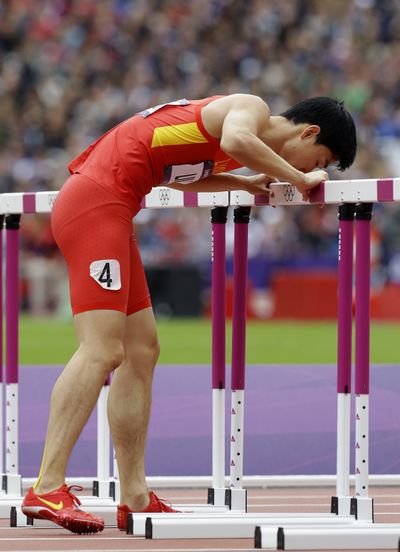Leicester: Liu’s hobble to finish will be remembered

LONDON – Seven steps, five more than in Beijing. But the outcome was identical: Liu Xiang’s Olympics were over, yet again, before they really began.
The magic ingredient that makes the games such compelling drama isn’t the stadiums or the crowds. It is their rarity. Once every four years – a gap long enough to make or break athletes.
Peak and attain perfection at just the right time and their names will live in Olympic history books forever. Make the slightest mistake or get hurt when that Olympic window opens once every four years and they might never get another chance to make it right.
The opportunities for redemption are so few. For some athletes, they never come. That rarity is what makes Olympic success so sweet, Olympic failure so bitter and it is why we and why athletes, for as long as they can, keep coming back for more.
Liu – the hurdler as famous and loved by Chinese as David Beckham is in England and Michael Jordan in the United States – tasted the sweetness once and, now, the bitterness twice.
Liu may never appreciate this and certainly not while the pain from his Achilles tendon and from his disappointment in London is so fresh and acute. But, sometimes, Olympic failures live longer in our collective memories than the successes.
Name the winner of the women’s 3,000 meters at the Los Angeles Olympics in 1984. I would bet good money you didn’t think of Maricica Puica or remember she was Romanian.
But, if you saw that race or just the highlights, the names Mary Decker and Zola Budd should bring the memories flooding back of them colliding, of the American tumbling and of her face contorted in anguish as she lay sprawled on the grass while the other runners carried on without her, chasing the gold she had been the overwhelming favorite to win.
A more recent one: the men’s 400 meters champion in Barcelona in 1992? It was Quincy Watts. But what you likely remember is not the American’s gold but Derek Redmond being helped across the finish line by his father, Jim, after his hamstring popped in the semifinals. The British runner’s determination – dragging his damaged leg, hobbling toward the finish – and his father’s support – running onto the track to give Redmond his shoulder to lean on – produced one of the most enduring memories of any games.
And, finally, the winner of the men’s 110 meters hurdles just eight years ago, in Athens in 2004?
That’s easier, because it was Liu and because his gold was the first won by an Asian in a sprint event.
But, as our memories of that success fade, we’ll remember Liu more for his epic Olympic disappointments and the sight of him hopping on his good leg and dragging his bad, both in Beijing in 2008 and now in London.
That is not being purposefully nasty. It’s simply because for mere mortals, non-Olympians, it is difficult if not impossible to truly imagine just how sweet it is to be in an Olympic champion’s shoes. But bitterness and heartbreak, well, they are things we all experience and can share and which, because of that, sometimes mark us more deeply. Crushing failure is tangible for all of us. Knowing what it feels like to stand on the Olympic medal podium, for most of us, is not.
And that is why the crowd in the 80,000-seat Olympic Stadium clapped for Liu after he pushed out of the starting blocks, took seven steps, clattered into the first hurdle, fell and, a few minutes later, picked himself up and hopped on his left leg the length of the straight to the finish.
Everyone understood his pain. Everyone could appreciate his courage. Many also will have understood that the London Games were Liu’s chance – perhaps his final chance – to redeem the disaster of Beijing.
Liu went into those Olympics, as British heptathlete Jessica Ennis did in London, carrying the hopes of the host nation. And since China has 1.3 billion people, that is a lot of hope, indeed. Anyone who was there will not have forgotten the gasps in the Bird’s Nest stadium and how Chinese spectators wept when Liu pulled up lame after just two full strides in his first qualifying round.
Likewise, the sight on Tuesday of Liu briefly resting himself on the 10th hurdle, having hopped the length of the track, will stick with spectators in London.
The fact that Liu was wearing the same bib number in Tuesday’s preliminary race – 1356 – as in the race in Beijing was bizarre, but nothing more than that. His “DNF” – “Did Not Finish” on the results sheet then and now had nothing to do with fate and everything to do with the right Achilles tendon that has plagued him for years. He rubbed it tenderly after his fall.
Doctors who examined Liu at the stadium suspected the tendon may have ruptured, said the head of China’s track team, Feng Shuyong. Feng added that it might have happened when Liu pushed off his right leg to clear the first hurdle, “because we all know that at the moment of taking off the tendon would bear very, very big … pressure.”
Of course, hopping bravely to the finish isn’t why Liu worked so hard. But the bitterness of that, of being unable to right the wrong of Beijing, of those rare, once every four-year chances that evaporated so agonizingly for him, will ensure Liu is remembered for a long, long time.